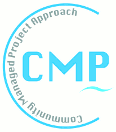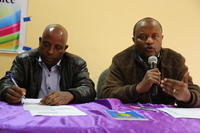SNNP COWASH Year End Workshop
The Water Resource Development Bureau of the Southern Nations, Nationalities and Peoples’ (SNNP) national regional states conducted a 2014/15 performance review and 2015/16 planning workshop on Community-Led Accelerated WASH (COWASH) projects on 18 July 2015 in Sodo town of Wolaita zone. Along with the stakeholders from Eight COWASH districts, three zones and regional sector bureaus and the federal technical assistance team, the annual workshop was graced by the presence of Samuel Tamiru, head of the regional Water Resource Development bureau.
Samuel who officially opened the workshop, while welcoming all the participants, expressed his hope that the event would provide an opportunity to review the performances of the fiscal last year and plan for the new budget year. According to Samuel, the lessons drawn from the achievements and challenges that encountered in the outgone fiscal year is important to successfully meet the targets of the 2015/16 plans.
The region that started implementing rural water supply using Community Managed Project (CMP) approach in two districts in 2012, community-led WASH projects are now being implemented in eight district. During the workshop in which each district assumed floor consequently to present its performance of 2014/15 and plan for 2015/16, it was reported that total COWASH kebeles in region grew to 105 in the 2014/15 fiscal year.
In the last budget year, the region managed to reach 127, 500 people with safe water supply; making the total beneficiaries of COWASH project 191,394 over the course of 4 years. With 337 more water supply schemes constructed this past fiscal year, the total number of COWASH water points increased to 516.
It was also reported that a number of capacity building activities were conducted. Kebele WASH teams, district WASH teams and appraisal teams were trained in CMP management. Some of the other training topics included Operation and Maintenance, CMP financial management, WASHCO CMP management, scheme management and artisan training. Though 75% of the training topics were administered, only 6,038 people, out of the planned 12,059, were trained.
“A number of challenges got in our way last year. On top of the weak inter-sector coordination, the support of zones to the project districts has been frustrating at times. Almost non-existent linkage between the zone and region coupled with inadequate support from the regional support unit hugely contributed to the underperformance of districts,” says Edegilign Hailu, capacity building and M&E specialist. Particularly, poor participation of Buraues of Health and Education in the COWASH project has resulted in only three institutional latrines which is far behind the target of 14.
Ato Samuel, who was also chairing a discussion session, underscored the need for each stakeholder to critically review and address these challenges in a bid to reach more people with safe water and improved sanitation and hygiene facilities. Reflecting on discussion points and setting the tone for the next fiscal year, the head gave due emphasis on effective coordination among all the sector actors. “It is crucial for all of us to get together and reach as many community as the plan before the completion of the last implementation year of COWASH Phase II,” says Samuel.
COWASH project of SNNP plans to construct in 2015/2016 a total of 296 community water points along with 24 and 8 institutional water points and latrines respectively. Excluding the contribution from the Government of Finland, the project zones and districts are expected to contribute 42.78 Million Birr for the investment and few procurements. As per the plan document, each district is expected to expand the CMP implementation to five new kebeles which bring the total COWASH kebeles in the region to 145. It was mentioned this plan and budget for the new fiscal year will be approved in early August when the regional steering committee meets.


